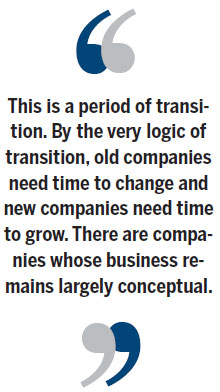Let steam out of overheated market
Updated: 2015-04-10 07:14
By Ed Zhang(China Daily Europe)
|
|||||||||||
Now is moment to launch reforms to shore up confidence and avoid crash
It's only a few weeks since the Chinese stock market started to rally. But now it's time to ask whether the bull-run has come too fast and too riskily. The Shanghai stock market index is at a new seven-year high.
It is common sense that when retail investors, especially those who never learned to read a company's financial reports, begin to sign up with brokers in massive numbers that the rally has reached its cliff. If that occurs, and it is occurring now, judging by the number of individual trading accounts newly opened on a daily basis, only irresponsible commentators would continue to say good things about the market.
If, as some people say, the Chinese stock market has two kinds of fundamentals - the economy's performance in terms of growth and the government's performance in terms of reform - then it is easy to see that neither the economy is at its strongest level nor is the reform at its smoothest stage.

In the past few weeks, investors have been inspired by Beijing's proposal of ambitious development programs and the opportunities that may come along with them at a corporate level. It will not be long before they grow anxious and demand the concrete data to support their belief in the changes that those programs promise.
But managing China is hard. Typically, the bureaucracy is slow to implement reforms, especially those meant to trim the existing power and interests of some officials. China's domestic A-share market is still waiting for the implementation of reform measures that the China Securities Regulatory Commission pledged a long time ago, including better policing of the market and heavier penalties for misbehaving companies.
In the meantime, the reform of state-owned national corporations, despite guidelines from nearly two years ago for them to adopt mixed ownership, namely to allow private sector investors to hold a larger share of their equity, has not yielded any result in a single company. The dividends of reform, as Chinese Premier Li Keqiang keeps talking about, are still to pay off in many industries and many areas.
Under such circumstances, the China market rally cannot be sustainable.
Admittedly, a more robust market can help the economy by channeling capital to the companies promising to deliver the changes called for by government. But most of them are just promising. Few are delivering.
In a few emerging industries, such as online financial services, there is still a lack of basic-level regulatory framework.

This is a period of transition. By the very logic of transition, old companies need time to change and new companies need time to grow. There are companies whose business remains largely conceptual. The nature of a quick and fragile stock rally and the nature of a long transition would clash and give rise to problems.
In fact, as some Chinese stock market observers have pointed out, the current rally is partly inspired by the government's future development programs, and partly driven by the reality that prospective returns from investing in other things is low. Quick returns are not coming from, say, investing in domestic and overseas real estate, or buying government bonds (most of which are still being designed), or directly funding a friend's business venture in whatever industry.
This amount of enthusiasm for investment, and the amount of liquidity that comes along with it, is very precious. But a crash of a poorly supported stock market rally would inevitably kill off that amount of enthusiasm, and lock up, if not wipe out, that amount of capital. Then it would be tantamount to a disaster.
At the moment, what the regulators can do to release some steam out of China's current rally, to slow it down, is to launch the long overdue stock market reforms, most importantly the one to safeguard shareholder rights, and possibly start the prosecution process of some bad companies.
After all, nothing can better sustain investors' trust in a market than building a sound legal system and regulatory institution for it.
The author is editor-at-large of China Daily. Contact the writer at edzhang@chinadaily.com.cn
(China Daily European Weekly 04/10/2015 page13)
Today's Top News
Putin backs China's Silk Road proposal
Boston bomber convicted, may face death penalty
Zhou trial likely to serve as model
Belarus to expand trade and economic ties with China
Cause of China chemical plant blast identified
Fleeing war-torn Yemen, Chinese, foreign nationals share the same boat
Liu Xiang expected to announce retirement on Tuesday
Toilet revolution for tourism evolution: Opinion
Hot Topics
Lunar probe , China growth forecasts, Emission rules get tougher, China seen through 'colored lens', International board,
Editor's Picks

|

|

|

|

|

|






